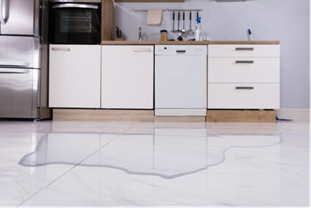
Many of us have experienced that sinking feeling of walking into a pool of water in your kitchen from a dishwasher leak, watching helplessly as water streams from your hot water heater, or watching water drip-drip-drip from a ceiling because of a roof leak. While these types of water intrusion events can cause you to freeze in your tracks, it is crucial that you act immediately to limit the potential water and mold damage to your home or workplace.
First thing's first: Promptly find the source of the water and stop it, if possible. Depending on the amount of water, the size of the affected area, and especially the duration of the water loss, you may need to contact a water restoration company to dry out the affected area as quickly as possible. If the water loss is not addressed soon after it starts, water can seep into drywall walls, baseboards, flooring, kitchen floor cabinets, bathroom vanity cabinets, and surrounding areas and rooms. It is critical to dry out the affected area as soon as possible because mold will begin to grow within 24–48 hours after a water intrusion event.
Now what: You’ve called a water restoration company and they have dried out the affected area, but you notice yellowish, greenish, or blackish spots or stains on the lower drywall walls, baseboards, or other surfaces in your home or workplace. Unfortunately, those spots or stains are most likely mold. (As you may know, mold feeds on drywall and other building materials, and when water is introduced, mold will quickly grow and spread.) What you do next is very important. If the area where you see the suspected mold growth is more than 10 square feet, or if you are concerned that mold may be concealed under the flooring or behind drywall walls, immediately contact a Florida licensed mold assessor. A Florida licensed mold assessor can inspect not only the affected area, but also the surrounding areas, and - if necessary - the entire home or workplace, to determine whether mold is present, and if so, the extent of the mold contamination and what needs to be done to remediate it. A licensed mold assessor should be able to:
An Ounce of Prevention… Can Save You a Ton of Money
Whether from a plumbing or roof leak or rainwater intrusion around windows and doors, a water loss not only causes water damage to your home or workplace, but it may also cause costly mold damage. One of the best ways to avoid this is to periodically inspect all potential water sources inside your home or workplace. This includes kitchen sinks, bathroom sinks, shower/tub faucet connections, toilet water supply lines, refrigerator water lines, washing machine water lines, A/C condensation drainpipes, and hot water heaters. Also check the caulking/weather stripping around windows and doors. In addition, if you plan to be away for more than a day, please turn off the water at the meter. I have been involved in too many major remediations costing thousands of dollars that could have been prevented if the water had been turned off at the meter before the homeowner/businessowner went away.
For more practical mold prevention tips that you can start implementing right away, please click here.
If you are concerned about mold in your home or workplace, or would like additional information, please contact Chuck at CFL Environmental Solutions. Chuck is a Florida Licensed Mold Inspector and a Certified Indoor Environmentalist, and he would be happy to use his expertise and experience to be of service to you.